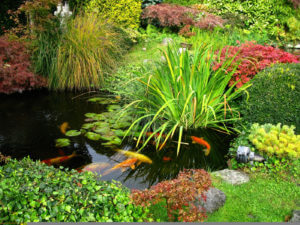The UK is renowned for it’s distinctive four seasons. With that pond owners should be well aware of the steps we need to take during each season to keep our ponds and their inhabitants healthy. The top concern for pond owners during warm summer months is the growth of green algae, which is a symptom of high nutrient levels.
Garden ponds are intended to be enjoyed and not to be a burden on your time cleaning and maintaining them. There are a few basic rules to follow when building a pond and adding in aquatic plants and fish. These will help avoid time spent agonising over green water, fish parasites or a carpet of algae suffocating your pond. A fish pond sited in partial shade with the correct size pump and filter to volume of water is a great start to keeping a pond healthy and happy!
Steps to keeping your pond healthy this summer
- Rake-out blanket weed from the surface of your pond. The algae will rob your pond of nutrients. Use a rake to gently drag the algae over the edge of your pond. There are likely to be insects and maybe tadpoles caught up in it so leave the blanket-weed to the side of the pond for a few hours to allow them to wriggle back into the pond. Then dispose of the blanket weed on the compost heap

- Allow the pond level to fluctuate naturally as much as possible. If you do need to top it up during a hot, dry period then it is best to use rainwater collected in a water butt. A significant drop in the water level will affect the amount of oxygen available for fish. Tap water is full of nutrients and will stimulate algae growth therefore should only be used when filtered rainwater isn’t available. If you lined your pond with a rubber pond liner, they are UV resistant. This means that if the water level drops and the pond liner becomes exposed, it won’t go brittle and crack
- Remove yellowing leaves from aquatic plants – don’t wait until they drop into your pond as they may find their way to the bottom of your pond where they will decompose affecting the health of your pond
- Depending on the type of system you have in your pond, will affect how often you need to clean the filter and pump. If you have a skimmer or biological filters, you will need to empty the debris nets or clean and rinse the filter pads in the skimmer. This won’t take much of your time but how often it needs doing depends on the amount of debris that falls into your pond. Mechanical filter pads also need cleaning and rinsing
- If you have fish then feed them regularly with a high protein food to encourage growth. Warm water temperatures stimulate metabolism but don’t be tempted to feed them more than they can consume within 3 to 4 minutes. Koi fish are omnivorous eating both plant and animal matter such as algae, aquatic plants, worms, larvae and crustaceans – therefore you can supplement their diet with what is available in your pond
Your pond is there to be enjoyed while sitting outdoors during those long summer evenings. By following these few summer maintenance tips and those of the previous 3 seasons, your pond should be a scene of tranquility and relaxation.





